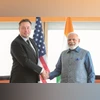On October 2, 2020, a Tesla fan club in India had asked Elon Musk on X (then Twitter) about the progress of the company’s entry into India. “Next year for sure,” Musk had replied.
The official confirmation of his interest came just two months later when Road Transport and Highways Minister Nitin Gadkari announced that Tesla was going to come the following year and set up a distribution facility (sales centre) for its cars in the country. And, if there was demand, possibly also set up manufacturing here.
After over three and a half years of both sides blowing hot and cold – to the point where his plans were temporarily shelved - Musk, the founder of Tesla and CEO of SpaceX, is now arriving in India on Sunday for a two-day visit. Ahead of the high-profile visit, X, also owned by Musk, is being tracked by those keen to know about his India itinerary that’s likely to range from a meeting with Prime Minister Narendra Modi at his residence to a spacetech do with startups at Bharat Mandapam in
He’s expected to announce that Tesla will set up a car and battery plant and also push his plans to launch Starlink’s satellite-based mobile broadband services which are already available in 70 countries.
More From This Section
Musk is still waiting for the government to issue the crucial GMCS licence, needed to start the broadband services.
The Starlink application was filed in November 2022.
It has been a roller coaster ride for Musk. In 2021, he charted out a plan for company-owned showrooms to sell imported Tesla models in India. A new company, a 100 per cent subsidiary, was incorporated in Bengaluru--Tesla India Motors and Energy Private Ltd.
It received government homologation certificates, which meant clearance for roadworthiness for Model 3 and Model Y of Tesla.
But soon the battlelines were drawn. Tata and Maruti Suzuki complained to the government, through industry body SIAM, that Tesla’s entry via imports would create a non-level playing field, especially as domestic companies like themselves had been subjected to stiff localization rules.
Tesla’s plan to set up single brand retail outlets also came under scrutiny. Tesla was expected to set off the sourcing of goods from India for global operations against the mandatory 30 per cent sourcing requirement. The question was whether Tesla bought enough components for its global operations to do so.
In a series of tweets, Musk expressed his frustration, making it clear that India’s import duty on Completely Built Up Unit vehicles of between 60-100 per cent was the highest in the world. He wanted it lowered to 40 per cent. He also wanted a differential customs duty structure for electric vehicles and ICE because imposing similar duties ‘was inconsistent with climate goals’.
But the government asked Tesla to first manufacture the vehicles in India rather than import them from China and then talk about duty cuts.
By 2022 it was clear that Musk had decided to put his India plans in cold storage. In May, he said he would not set up manufacturing in any location unless he was allowed to sell and service cars. He reallocated his India team to other countries.
But a meeting in New York with Modi in June in 2023 led to Musk saying afterwards ‘’I am a fan of Modi’’ and the rekindling of his India plans. A month before the meeting, top Tesla executives had come to India to look at doubling sourcing and had met senior government officials.
Eventually, a solution was thrashed out which both protected domestic car makers and allowed Tesla to enter the country.
A new policy for electric vehicles slashed imports on cars with a CIF value of $35,000. In return, car makers had to invest a minimum of $500 million over three years on a plant in India with domestic value addition rising to 50 per cent in five years.
Musk also faced serious challenges in rolling out his satellite broadband services. Starlink put together an ambitious plan in 2021 to operate 200,000 of its devices out of which 80 per cent would be in rural areas by December 2022. But the plan never took off.
Rather, it got into a serious mess when the Department of Telecommunications rebuked Starlink for taking pre-bookings of $99 from 5,000 odd customers even though it had failed to receive its GMPCS licence which it needed to operate in India.
It was forced to return the money and Musk’s friend from Paypal, Sanjay Bhargava, who headed the operation, decided to quit in December 2021.
Musk also was compelled to re-tweak his strategy for India and applied for the licence but only for business-to-business services and not to link homes in the country (point-to-point) like its competitors One Web and Reliance.
But Starlink may have to wait for months to begin services. Apart from the licence, it has to get authorisation from the space regulator. And, telecom regulator Trai is yet to suggest the administered price for satellite operators.

)
